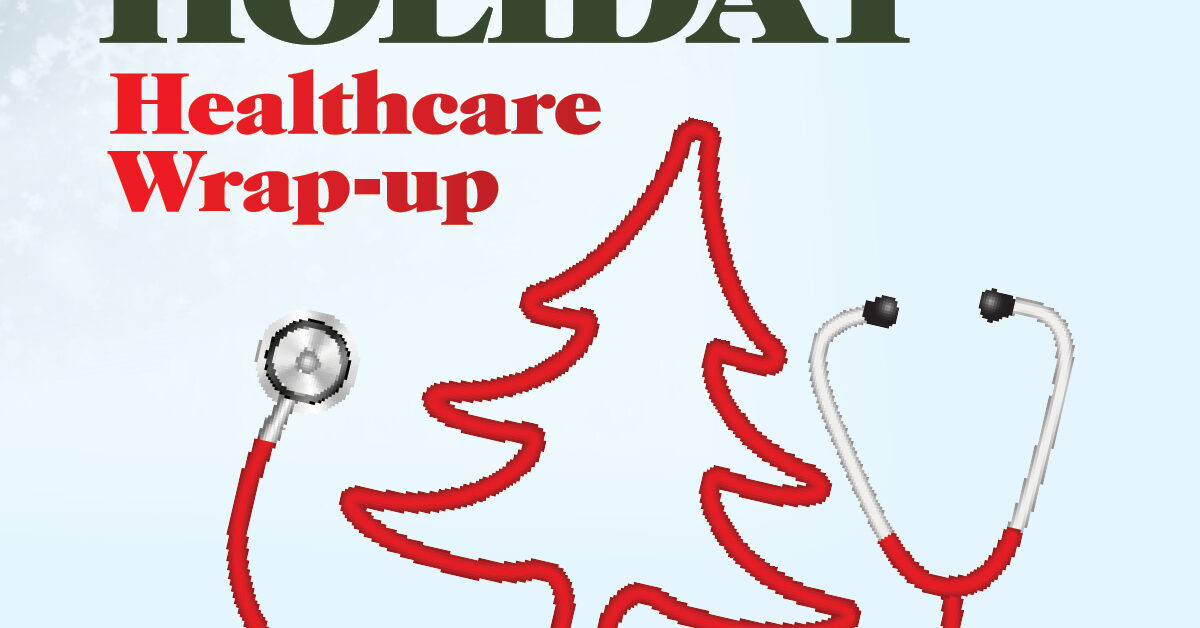Letting Go and Moving Forward
November 2022
First Person: Dr. John Noble Jr. Orthopedic Surgeon, President of Noble Development, and President of the Louisiana State Medical Society
December 2022December is full of fun and festivities. Keep focusing on healthy living with these tips in our special holiday healthcare section so you can enjoy every minute of the holiday season!
Mindful Eating During December
According to a study in The New England Journal of Medicine, the average person gains approximately one to two pounds over the holiday season. That doesn’t sound so bad, but the problem comes when that weight makes itself a permanent fixture in your body. The study says it can take up to five months to lose the weight gained during Thanksgiving and Christmas, or worse yet, that the gain is never shed, which can be a big problem over time. Two pounds times ten years equals twenty pounds!
The best advice is to not gain weight in the first place, which we know is easier said than done. But not impossible. We offer a few tips to keep the scale from budging this holiday season:
- Know your triggers and weaknesses. If sugary desserts are your downfall, don’t bring a pecan pie to the potluck. Is savory and salty your snack of choice? Keep them out of the house to decrease temptation.
- Plan ahead. If you know you are headed to the office party after work, eat a sensible nutritious breakfast and lunch. If you’re tempted by tantalizing party treats (and who isn’t?) eat a healthy snack before you arrive at the event so you’re not famished. If you don’t have an appetite, you’re less likely to overeat.
- Don’t totally deprive yourself. Saying no to that cookie you’re craving only prompts obsession and overeating later. So, go ahead and have a slice of pie or a piece of cake. But not both.
- Be mindful of alcohol consumption. Not only does alcohol have beaucoup empty calories, but it decreases your inhibitions, making it more likely that you’ll eat more food than you intended. Like much in life, moderation is key.
- Watch out for non-alcoholic liquid calories, as well. Punch, eggnog, cider . . . the bevy of high-calorie beverages available this time of year can sneak up on you. Stick to water or carbonated flavored water.
- Two words: small plates. If you stack a smaller plate full with your favorites, you’ll feel more satisfied than if you fill a larger plate only half full.
- Eat slowly. Because of the way our stomach communicates with our brain (there’s a delay), the faster we eat, the more we tend to consume.
- Make time for exercise. I know, it’s a busy time of year! But make exercise a priority. Your body will thank you.
- If you’ve overindulged (and we all do on occasion), plan to get back on track. It is the holidays, after all, and if we don’t overdo it too much, a bit of ‘celebrating’ is a welcome break when visiting with family and friends. That said, it’s important to get back on track quickly.
- Don’t beat yourself up. Slip-ups happen, especially this time of year. Forgive yourself and continue with your healthy lifestyle. Health and fitness is a journey, with ups and downs and bumps in the road.
- The holidays are chock full of parties, family gatherings, and other social events which inevitably include rich, delicious food – and lots of it! To prevent weight gain from these encounters, focus on your friends and family rather than the food. Intentionally chat with as many guests as you can. Catch up with the people you haven’t seen in ages and make a few new friends. The buffet table will still be there.
Managing Holiday Stress with a Chronic Condition
by Christine Fisher
Stress and the holiday season can go hand-in-hand, but for those with a condition that worsens with stress, such as arthritis, now is the time to take control and limit exposure to stress-causing situations.
Many times, that’s easier said than done, but incorporating a few simple techniques can make a significant difference in one’s health, according to Jason Fuqua, MD, family medicine physician and member of the West Calcasieu Cameron Hospital medical staff.
“Stress can be a contributing factor to exacerbating pain, anxiety, and other medical problems,” says Dr. Fuqua. “Managing stress is important every day, but it is especially important for those battling chronic ailments, such as arthritis.”
Increased stress can have a negative impact on one’s health. “If you suffer from arthritis, the tension that many experiences during the holidays can heighten the effects of chronic pain,” Dr. Fuqua explains. Some people may notice an increase in migraine headaches, stomach disorders, fatigue, short tempers, difficulty concentrating, and sleep problems.
If you have an autoimmune disorder or problems with your joints or tendons, Dr. Fuqua advises paying careful attention to your activity level. Over-activity and unhealthy habits, such as neglecting exercise and eating an unhealthy diet, will make things worse. “Find ways to ease the stress. Exercise, meditation, and good nutrition will keep your body in a good rhythm and strong enough to help combat the level of stress we may experience during the holiday season,” he says.
Develop effective coping skills for holiday-related activities, such as entertaining, cooking, decorating, or family gatherings to increase enjoyment this season. “Most of us enjoy these times, but it can easily get overwhelming, turning what should be a happy time into something more stressful,” says Dr. Fuqua.
- Flexibility in planning events helps. If you’re not up to hosting or entertaining, know when to draw the line. Do as much as you enjoy, but don’t overdo it.
- Enlist help as you make preparations. Don’t do everything alone. Listen to other people’s ideas and compromise. The process of planning holiday gatherings can be as enjoyable as the event itself.
- Scale down your expectations. Focus on the spirit of the season. Slow down and spend time together with family and friends.
- Keep a regular schedule of exercise. Neglecting your regular walk, yoga, or water aerobics will only worsen your stress level.
- Pay attention to your own feelings. When you begin to feel overwhelmed, it’s time to pull back and slow down. Don’t try to muscle through it. Try not to commit to anything that you can’t adjust if it begins to feel too much. The holidays are meant to be a joyful celebration, not add to the stress level.
“As with any chronic health problem, it’s good to reduce anxiety by maintaining a manageable schedule, staying active, and keeping a positive attitude. Every case is different,” Dr. Fuqua says, “but those behaviors generally help the patient cope and ease through the holiday season with as little stress as possible. This not only helps someone with arthritis to enjoy the holidays but promotes physical comfort, too.”
Keep Chronic Pain Under Control During the Holidays
The holidays are a time when everyone is encouraged to be in good cheer.
But this joyous time of year is a lot less merry for those suffering from chronic back pain, migraines, arthritis, and other pain-inducing ailments. “Any kind of pain can seriously affect your quality of life,” says Dr. Tom Macek, an anesthesiologist, and partner at American Pain Experts. “Sometimes, of course, pain is temporary. It quickly fades and all is well. But for some people, the pain doesn’t go away – at least not for long – and that’s what we consider to be chronic pain. In those cases, it’s crucial to determine what’s causing your pain and to get it under control.”
A doctor may prescribe medication and therapy for patients who are enduring these worst-case scenarios, but Macek says there are steps anyone can take on their own to avoid or reduce pain.
- A long winter’s nap can be a pain in the neck. You wouldn’t think you could harm yourself much by going to bed at night, but you actually can cause quite a bit of damage, Macek says. Neck pain is common. Massages, chiropractic adjustments, and medication can help, but in the meantime, a few adjustments with your pillow might provide relief. If you sleep on your back, use a thin pillow that keeps the curvature of your neck the same as it usually is when you’re standing. If you sleep on your side, use a thicker pillow that keeps your head positioned in the middle of your shoulders. And if you sleep on your stomach, Macek says, consider changing your habits because that position creates the most stress on the neck. The lower back is an injury waiting to happen. If your mother told you not to slump, she was right. Poor posture contributes to lower-back pain, so sit up straight. Lifting heavy objects correctly can also help you avoid back problems, which is worth keeping in mind if Santa is delivering anything with a little heft this year. People often bend over to lift things and that’s a mistake, Macek says. Instead, keep your chest forward and bend at the knees.
- Try to keep stress to a minimum. Ambitious revelers can create an intimidating to-do list at holiday time, but the stress that comes with hosting parties and standing in long retail-store lines can take its toll. Anyone dealing with chronic pain already feels stressed, so it’s best to reduce as much of that stress as possible, Macek says. To accomplish that: Get a good night’s sleep. Exercise regularly. Make sure you eat a balanced diet, including whole grains, lean meats, fresh vegetables, and fresh fruit. (Admittedly, that could be a tall order when the chocolate-covered cherries and sugar cookies beckon.)
“Sometimes just a few easy steps can help alleviate at least some of your pain and then you can enjoy your holiday activities,” Macek says. “But if pain won’t go away and is more than you can bear, it’s time to visit a physician.”
Source: www.Americanpainexperts.com
You Better Watch Out for Holiday Health Risks
The joy of the holiday season can lighten the heart and lift the spirit, but it can also be a time of not-so-jolly health problems. All the things we love about the holidays – shopping, parties, visiting with family and friends, eating and drinking – can increase the risk of certain health problems.
But that doesn’t mean you have to miss all the fun. By being aware of the risks and taking a few precautions, you can stay healthy and enjoy the holiday season.
“During the holidays, many people get busy, and either doesn’t have time to follow their regular diet and exercise program or choose to take a break. Parties, shopping, guests, and other activities provide the perfect excuse for skipping a workout or indulging in foods that are higher in fat, sodium, sugar, and calories – all things that are not good for your health,” says Dr. Marissa De La Paz, family medicine physician with Imperial Health. “In addition, the hectic pace of the holiday season can cause people to forget to take medications. Those who are traveling may forget to pack prescriptions and be unable to get refills during the time they are gone.”
Dr. De La Paz provides an overview of some of the more common health issues that occur during the holidays, along with advice on how to prevent these unwelcome gifts from interfering with a happy holiday.
Germs
We all have a new understanding of the spread of germs after the past two years of the COVID-19 pandemic, and that risk continues. With all the season’s greetings, gatherings, crowded stores, airports, and hotels, germs remain unseen and unwelcome party-crashers that show up in droves during the holiday season to increase the risk of COVID, cold, flu, and many other types of viruses. In addition, more people stay indoors during colder months, which simply leads to germs and viruses being passed around more frequently during the holidays. High-risk areas include check-out lines, bank machines, handrails, and shopping cart handles “Washing your hands is by far the best thing anyone can do, at any time of the year, to keep germs in check,” says Dr. De La Paz. “Use soap and running water if possible. If you aren’t near soap and water, anti-bacterial gels are a good second choice. Keep some with you on your desk, in your purse or bag, in your vehicle, and in as many places as you can so you’ll remember to use them.”
Allergies
People with allergies face unique health challenges during the winter holidays. “For those with known food allergies, extra care is needed during the holidays when so many different people are preparing foods,” says Dr. De La Paz. If you aren’t sure of the ingredients in a dish, ask, or if you can’t find out, don’t eat it. Also, take time to check restaurant menus before eating out and always have an epinephrine injection kit available in case of a reaction.”
Airborne allergies can also flare up during the holidays. Molds are not usually a problem in the winter, as their counts are lower, but the greenery many people bring into their homes, including Christmas trees, can harbor mold spores. Dr. De La Paz advises using an artificial tree or greenery if you are prone to indoor allergies. Clean or replace home air filters, as well as those in portable air cleaners. Limit or remove scented candles, potpourri, and similar items that may trigger an allergic response. She adds that caution should be used when using spray-on “snow,” and popular pine-scented sprays or oils, which can cause allergic reactions in some people.
Kitchen Injuries and Food Illness
All that cooking and baking around the holidays increases the chances of getting burned, either by touching a hot pan or by spattered grease. Dr. De La Paz recommends having plenty of potholders, oven mitts, and dishcloths handy. Also be careful of too many “helpers” in the kitchen, as a crowded space can cause more chaos. She says food poisoning is another risk. Check the expiration date on all foods before eating or serving them. Wash knives, cutting boards, and work surfaces regularly, as well as your hands. Don’t keep food sitting out at room temperature for too long.
Toys
Each year, over 150,000 children under age 15 are treated for toy-related injuries in emergency rooms, according to the U.S. Consumer Product Safety Commission. “A lot of toys have moveable and detachable parts, and the smaller the child, the bigger risk,” says Dr. De La Paz. She says toys with small parts that can cause choking should be avoided for children under age three, and children under eight should not have toys with sharp edges or electric toys with heating parts. “Choose toys suitable for the child’s age, abilities, skills, and interest level,” she recommends. “Look for labels with age and safety advice, and discard plastic packaging wrap immediately, which can suffocate a child. Much of toy safety is common sense, and adult supervision also is critical. In addition, make sure toys appropriate for older siblings but not young children are kept out of reach.”
Heartburn
Rich holiday food may leave some people reaching for the antacids instead of the leftovers. According to Dr. De La Paz, for those who experience chronic acid reflux or gastroesophageal reflux disease (GERD), the holidays can be especially painful. She explains that acid reflux is a common and chronic digestive condition caused by a weakened lower esophageal sphincter (the valve between the stomach and esophagus) that allows stomach acid to back up into the esophagus. Heartburn, sour taste, and indigestion are the most common symptoms. “The holiday season is one of the worst times of the year for patients with GERD,” she says. “The large amounts, and different types of food, we eat during the holidays can lead to extreme discomfort for chronic heartburn sufferers. It’s important to stay focused on your dietary recommendations and make sure you take any medications as directed.”
Heart Health
The holidays are full of surprises but a heart attack is something no one would ever expect. However, multiple studies have found that the incidence of heart attacks occurring the two weeks before and the two weeks after Christmas increased significantly, with the highest increase being found on Christmas Eve. Dr. De La Paz says there are several contributing factors behind the increased incidence. People with symptoms of heart trouble during the holidays are less likely to see their physicians when they first notice symptoms, mistakenly thinking they can just deal with it after the holidays are over. Other holiday-related risk factors include too much food, too little exercise, added stress, and alcohol. She stresses it’s important to never ignore any heart-related symptom. Always get it checked out to help prevent a more serious problem.”
“Don’t let a preventable health problem put a damper on your holidays,” says Dr. De La Paz. “Take a few precautions and enjoy the season in good health!”
To schedule an appointment with Dr. De La Paz, call (337) 474-2856.






